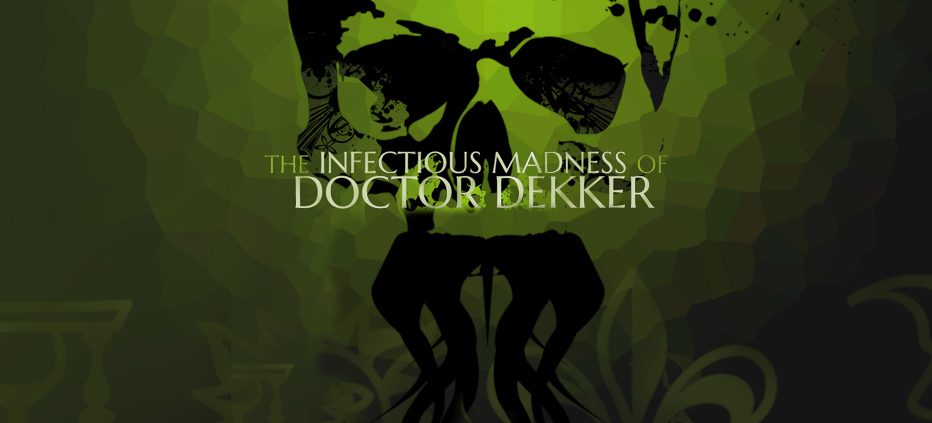The Infectious Madness of Doctor Dekker
Developer: D’Avekki Studios Ltd | Publisher: D’Avekki Studios Ltd | Release Date: 2017 | Genre: Adventure / Indie / Casual / Simulation | Website: Official Website | Purchase: Steam
In theory, being a psychiatrist sounds like the easiest job on earth. You simply sit back and pretend to listen to your patients ramble on about their problems while you doodle in your notepad. Then, after repeating this for a couple of sessions, you blame everything on their mother and collect a nice paycheck. Unfortunately, it doesn’t quite work that way in The Infectious Madness of Doctor Dekker, a new FMV adventure title by D’Avekki Studios Ltd.
The game places you in the role of a psychiatrist who has to step in and treat the patients of the titular Doctor Dekker. Unfortunately, your predecessor met a grisly fate, and all evidence seems to point towards one of the patients being the culprit. This means that you not only have to try and help these patients with their mental issues, but also try and uncover which one of them helped Dekker to shuffle his mortal coil. It’s not going to be easy though, as not only does everyone have a motive for killing the doctor, but digging too deep into the mystery might end up costing you your sanity as well.
Even back in the nineties when full motion video games became more common due to the increased storage capabilities of CD-ROMs, the genre didn’t exactly garner a lot of critical acclaim. The fact that most titles ended up being “interactive movies”, which usually translated into bad acting, poor video quality and limited interaction didn’t help either. However, the genre has been seeing a bit of a revival lately and, surprisingly enough, not all of the newer titles are terrible. In fact, TIMODD isn’t just one of the best titles in the genre, but also a great game in its own right. This can be chalked up to a couple of factors, the most important of which is the fact that both the story and acting are actually great.
Like most FMV titles the gameplay of TIMODD is still rather limited and your only means of progressing the story is asking your patients questions via a text interface. Ask the right questions and they will reply in full screen video using one of the more than 1600 responses in the game. While the amount of responses are numerous, they are still finite, which means this game is by no means an AI simulator. Instead, all the responses are keyword based, which is both a blessing and a curse. When it works, it works brilliantly and you really feel like you are interacting with your patients. Unfortunately, when you get it wrong, you’ll become very familiar with the myriad of ways in which patients can tell you that they don’t know what you are talking about.
This can be extra frustrating when you are questioning them about simply they just mentioned and they respond by acting like you are speaking in Latin. Even worse is if you know exactly what you want to ask, but can’t seem to string together the right combination of keywords to trigger a response. Thankfully, the developers have already made several keyword improvements to the game, which improved the experience. In addition, the game also features a hint system that can put you on the right track if you get stuck. There is no penalty for using hints either, although they do have a cooldown period that is dependent on the difficulty level you have chosen.
TIMODD is split up into five therapy sessions where you get to grill the six patients who could be implicated in the murder of Dekker. Interestingly enough, the murderer is randomly chosen at the start of the game and the game also features multiple endings. Most of the story can be experienced during a single playthrough, but those who want to see all the endings are free to start from scratch and see what new information they can uncover. Along with the regular patients who crop up in every session, you’ll also encounter a couple of other “once-off” characters who function like side quests. Not only are their stories just as interesting as the main characters, but they also provide a nice distraction and can offer valuable clues that tie in to the rest of the story.
One area where TIMODD excels is the story and we are definitely not going to spoil anything in this review. Suffice to say that virtually all of your patients appear to have symptoms of psychokinesis, which means their problems are anything but ordinary. Making matters even more engrossing is the brilliant performances by the actors and we frequently found ourselves hanging on every word they say. Aislinn De’Ath in particular does a great job portraying Marianna wh ile Bianca Beckles-Rose shines in the role of your assistant, Jaya. Appropriately enough, the game has a bit of a Lovecraftian theme, so if you dig deep enough into the problems of your patients you might just end up seeing some bizarre things yourself!
Playing the game is extremely simple and the interface is very streamlined. All of your questions are typed in an input box at the top of the screen while links to your notes, evidence, and question history can be accessed on the left. The game keeps track of all the relevant questions or keywords you use and displays asterisks next to these to indicate if follow up questions are possible. Indicators are also displayed next to the names of characters to show when you can move on to the next session. You only have to get enough answers from each character to turn their indicator yellow if you want to proceed, but you are also free to keep going until the indicators turn green to signify that you have found every response. Doing so can yield a lot of extra information, but also has consequences. Any answers you get can be replayed to ensure you haven’t missed something, but the game saves automatically, so there is no way to take back what you have said to patients. Our only gripe with the interface, apart from the sometimes frustrating issues it has with keyword synonymous is the fact that it is also possible to accidentally use keywords that trigger responses that are out of sequence. This can be confusing to say the least, but luckily it didn’t happen to use too often.
Considering that TIMODD is an FMV game, the full screen, high definition videos looks great and we were impressed by the video quality. Of course, due to the amount of videos, the game comes with a sizable installation, which can be an issue for players with slow internet connections or bandwidth limitations. All of these videos are put to good use, though, as you’ll not only see plenty of full screen responses from characters, but also short clips of them performing various actions as they wait for you to interact with them. These clips of the actors fade in and out as their surroundings, which consists of your office wall and a large green couch, remains static. The game also makes good use of framing to enhance the creepy atmosphere of the game throughout. The soundtrack is also suitably atmospheric and sets the tone for the game without becoming obtrusive.
Overall, TIMODD offers a lot of content and an engrossing experience for a surprisingly modest asking price. It is still an FMV game, which means limited interaction and a fairly linear story, but makes up for this with a great story and superb acting. While some small niggles detract slightly from the experience it is still a title that we wholeheartedly recommend to anyone who can appreciate a good story. If you are in the mood for something a little different then don’t hesitate to pick up this game.
System Requirements
- OS: Windows 7,8,10
- Processor: Pentium 4 SSE2 onwards (dual core)
- Memory: 2 GB RAM
- Graphics: Intel HD3000 or comparable
- Network: Broadband Internet connection
- Storage: 20 GB available space
- Additional Notes: Must be capable of playing full HD videos
- OS: OSX 10.9 onwards, 64 bit
- Processor: Intel
- Memory: 2 GB RAM
- Graphics: Intel HD3000 or comparable
- Network: Broadband Internet connection
- Storage: 20 GB available space
- Additional Notes: Must be capable of playing full HD videos



















